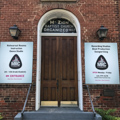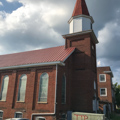Mount Zion Baptist Church played a central role in the formation of Charlottesville's African American community in the period after the Civil War. A group of former slaves established the congregation in 1867. The 1883–1884 brick structure replaced an earlier (c. 1875) frame church on the same site. Local lore holds that Spooner, a Charlottesville architect, designed the structure. In the Italianate idiom popular with Baptists after the Civil War, the church is relatively plain on the exterior with a dominant entrance tower and steeple and corbeled brick detailing at the eaves and in recessed panels on the tower. The interior is a large three-aisle space with galleries on three sides and some stock colored glass windows.
You are here
Mount Zion Baptist Church
1883–1884, attributed to George W. Spooner and/or George A. Sinclair, builder. Later alterations. 105 Ridge St.
If SAH Archipedia has been useful to you, please consider supporting it.
SAH Archipedia tells the story of the United States through its buildings, landscapes, and cities. This freely available resource empowers the public with authoritative knowledge that deepens their understanding and appreciation of the built environment. But the Society of Architectural Historians, which created SAH Archipedia with University of Virginia Press, needs your support to maintain the high-caliber research, writing, photography, cartography, editing, design, and programming that make SAH Archipedia a trusted online resource available to all who value the history of place, heritage tourism, and learning.

























